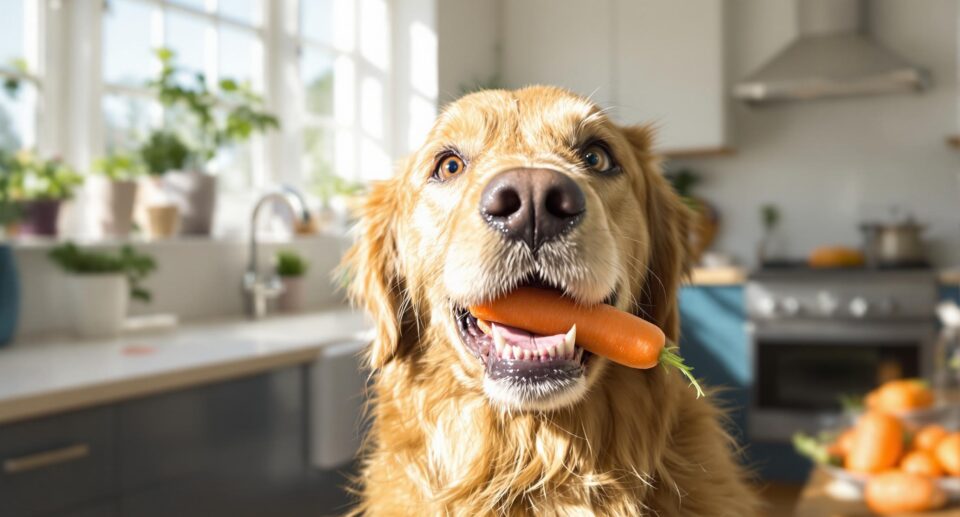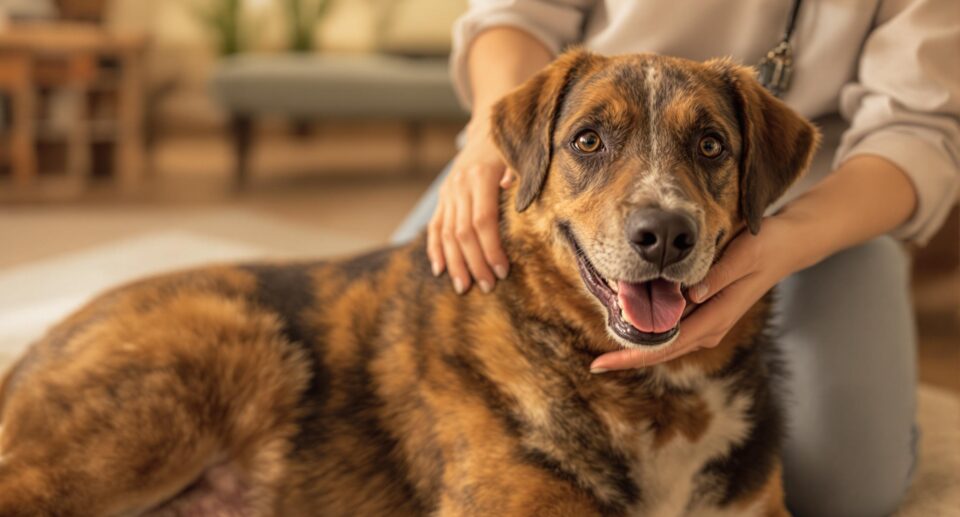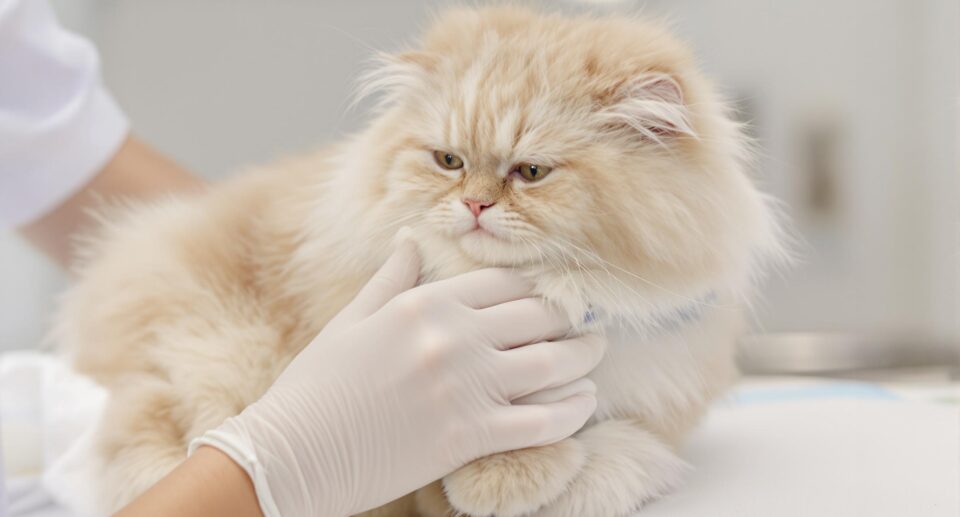Can Dogs Eat Carrots? A Guide to This Crunchy Treat

Key Takeaways
Carrots are a safe and nutritious dog treat, providing essential nutrients like vitamin A, fiber, and potassium.
Carrots support dental health by acting as a natural toothbrush and helping maintain oral hygiene.
When serving carrots to dogs, proper preparation and portion sizing are crucial to avoid choking hazards and ensure easy digestion.
Your dog might perk up when you chop carrots for good reason. Carrots are safe for dogs and provide nutrients like vitamin A, fiber, and potassium. They also help clean teeth thanks to their natural crunch. You can explore more healthy treat options in the Dog Treats category.
Raw carrots are great for dental health, while cooked ones may be easier to digest. Start with small portions and see how your dog does. Your vet can help you decide what is best based on your dog’s needs. PetHealthMD offers guidance to help you understand healthy treat options like carrots so you can make confident choices with your vet.
Why Carrots Can Be a Healthy Addition to Your Dog’s Diet
Carrots offer more than a satisfying crunch they can support your dog’s health in a few ways.
Natural Dental Care
When your dog chews raw carrots, the crunchy texture works as a gentle aid you can use together with dental treats to help support oral health. Carrots offer a natural alternative to processed dental treats while also providing important nutrients. For more dental helpers, visit the Dog Dental Care category.
Rich in Essential Nutrients
Carrots are packed with beta-carotene and other beneficial nutrients you can combine with your dog’s daily vitamin supplements for extra immune and vision support. Carrots also supply vitamins C and K for overall wellness.
Supports Digestion and Weight Management
High in fiber, carrots promote healthy digestion and can help with weight control because they are a low-calorie treat. This makes them a satisfying addition you can serve alongside your dog’s regular food, especially for those on weight management plans. Explore more wellness options in the Dog Health category.
Preparing Carrots for Your Dog
Turning carrots into a healthy treat for your dog is simple, but a few thoughtful choices can help you make the most of this nutritious veggie.
1. Start with Clean, Fresh Carrots
Wash thoroughly under cool water to remove dirt and residue.
Use a vegetable brush to clean crevices.
Remove leafy green tops, which can cause digestive upset.
2. Choose the Right Serving Size by Dog Size
Small dogs under 20 lbs: Grated carrots or pea-sized pieces
Medium dogs 20–50 lbs: 1-inch coins or chunks
Large dogs over 50 lbs: 2–3 inch sticks
3. Pick a Preparation Method That Suits Your Dog
Raw: Crunchy and satisfying, raw carrots help support dental health by naturally scraping plaque from your dog’s teeth.
Steamed or boiled: Lightly steaming or boiling carrots softens them, making them easier to chew and digest.
Frozen: Frozen carrot sticks or coins provide soothing relief for teething puppies.
Grated: Mix grated carrots into your dog’s regular meals.
Pureed: Blend cooked carrots into a smooth puree and serve a small spoonful as a meal topper.
Baked: Incorporate grated carrots into homemade dog treats baked at 300°F for 35–40 minutes.
4. Add Variety to Mealtime or Treat Time
Mix grated carrots into meals for a nutritional boost.
Bake homemade carrot treats at 300°F for 35–40 minutes.
5. Supervise Treat Time
Always monitor your dog when offering carrots, especially at first, to ensure they chew and swallow safely.
Other Dog-Friendly Vegetables to Explore
Offering a variety of safe, nutrient-rich vegetables can help support your dog’s overall health. Introduce new foods slowly and in moderation.
Green beans: Low in calories and high in fiber.
Sweet potatoes: Packed with fiber and vitamins when cooked.
Broccoli: A crunchy, antioxidant-rich treat in small amounts.
Zucchini: Hydrating and gentle on digestion.
Cucumbers: Crisp and refreshing.
Spinach: Nutrient-rich but best used in small amounts.
Always avoid onions, garlic, leeks, and mushrooms, which can be harmful or toxic to dogs.
Frequently Asked Questions About Dogs and Carrots
Can puppies eat carrots?
Yes, puppies can enjoy carrots, especially when frozen and cut into puppy-safe pieces.
Are baby carrots safe for dogs?
Baby carrots are safe but can be a choking hazard if given whole. Cut them based on your dog’s size.
Can dogs eat carrot tops or greens?
Carrot greens are not toxic but may cause digestive discomfort.
Do carrots help with bad breath in dogs?
Carrots may help freshen breath slightly but do not replace regular dental care.
Can dogs be allergic to carrots?
Allergies are rare. Watch for itching, vomiting, or loose stools.
Are canned carrots okay for dogs?
Unsalted, unseasoned canned carrots are safe in small amounts, but fresh or steamed are healthier.
How often can I give my dog carrots?
Carrots can be given a few times a week or even daily in small amounts.
Smart Steps for Serving Carrots
Carrots offer excellent nutritional benefits that support your dog’s well-being. These crunchy vegetables help support vision, dental health, digestion, and the immune system thanks to their vitamins and antioxidants.By thoughtfully adding carrots to your dog’s treat rotation, you are taking a positive step toward supporting their health and happiness. PetMeds makes it easier to care for your pet’s well-being with a wide selection of vet-approved supplies, supplements, and everyday essentials delivered right to your door. Visit the Dog category to find everything you need.





